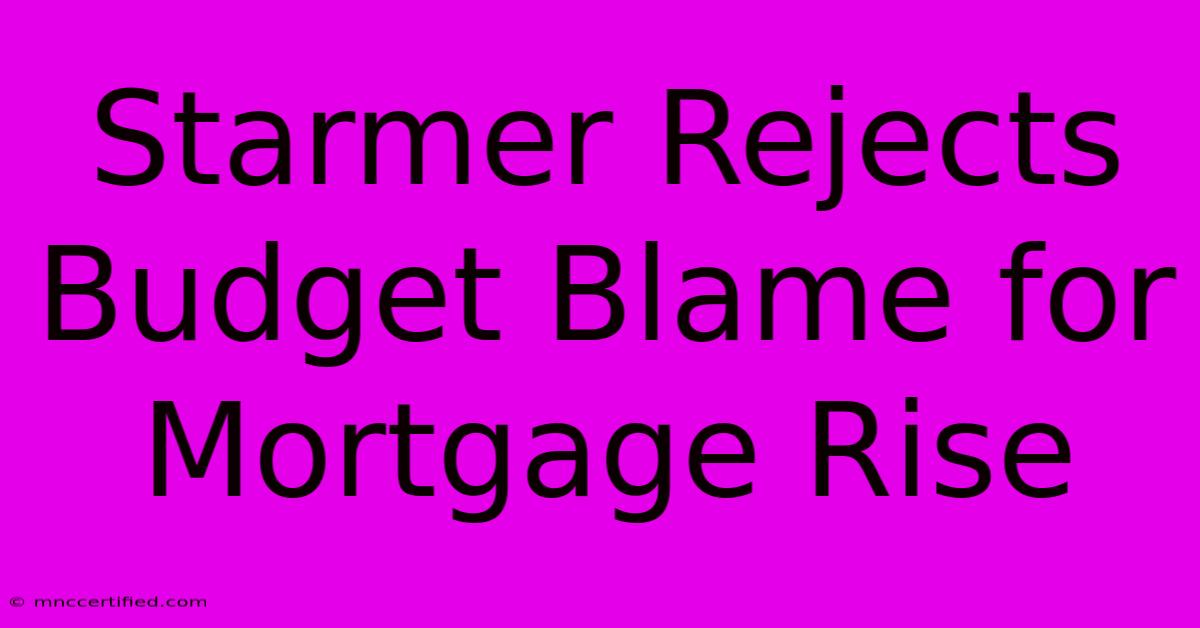Starmer Rejects Budget Blame For Mortgage Rise

Table of Contents
Starmer Rejects Budget Blame for Mortgage Rise: A Deep Dive into the UK's Housing Crisis
The UK is grappling with a significant rise in mortgage rates, leaving many homeowners and prospective buyers anxious about the future. Labour leader Keir Starmer has directly rejected accusations that his party's proposed budget policies are to blame, sparking a heated political debate. This article delves into the complexities of the situation, examining the various factors contributing to the mortgage crisis and dissecting Starmer's arguments.
The Current Mortgage Market: A Perfect Storm?
The current turmoil in the UK mortgage market isn't attributable to a single cause. Instead, it's a confluence of factors, including:
-
Rising interest rates: The Bank of England's efforts to combat inflation have led to a significant increase in interest rates. This directly impacts mortgage rates, making borrowing more expensive. This is arguably the most significant factor driving the current crisis.
-
Global economic uncertainty: Global economic instability, including the ongoing war in Ukraine and persistent supply chain issues, contributes to volatility in the financial markets, impacting lending rates.
-
Government policy: While Starmer denies responsibility, government policies, both past and present, inevitably play a role in shaping the economic landscape and influencing market confidence. Critics point to various aspects of fiscal policy as contributing factors.
-
Lender behavior: Individual lenders also play a role. Their risk assessments and lending criteria can influence the availability and cost of mortgages.
Starmer's Rebuttal: A Political Tightrope Walk
Keir Starmer has vehemently rejected claims that Labour's proposed policies are responsible for the rising mortgage rates. His argument centers on the assertion that the primary driver is the Bank of England's independent monetary policy response to inflation. He highlights the global nature of the issue and emphasizes the Conservative government's economic record as the root cause of the current instability.
This stance is a crucial element of Labour's broader economic strategy. By distancing themselves from the blame, they aim to portray themselves as a responsible alternative government capable of managing the economy effectively. However, this position is not without its challenges. The opposition will likely continue to press the issue, seeking to exploit any perceived weaknesses in Labour's economic proposals.
Analyzing the Political Fallout
The debate surrounding mortgage rate increases has significant political ramifications. The Conservatives, facing criticism for their handling of the economy, are likely to continue to highlight the issue, aiming to paint Labour as economically incompetent. Meanwhile, Labour must carefully navigate this complex issue, balancing the need to offer solutions with the imperative to avoid being held responsible for problems largely outside their immediate control. Public opinion will be crucial in determining the political fallout from this ongoing crisis.
The Path Forward: Potential Solutions and Long-Term Strategies
Addressing the UK's housing crisis requires a multi-pronged approach. This includes:
-
Targeted government support: While direct intervention is controversial, targeted support for vulnerable homeowners might be necessary to prevent widespread mortgage defaults.
-
Financial literacy programs: Improving financial literacy amongst the population can empower individuals to make informed decisions regarding mortgages and personal finances.
-
Long-term economic stability: Focusing on long-term economic stability and sustainable growth is paramount to create a more resilient housing market.
-
Increased housing supply: Addressing the underlying issue of a housing shortage through increased construction and planning reforms is essential for long-term affordability.
Conclusion: Navigating the Mortgage Maze
The rise in UK mortgage rates is a complex issue with no easy answers. While Keir Starmer's rejection of direct blame is politically expedient, the underlying economic realities cannot be ignored. The path forward requires a collaborative effort from the government, financial institutions, and individuals to navigate this turbulent period and build a more stable and affordable housing market for the future. The ongoing political debate will undoubtedly shape the response, highlighting the crucial role of public discourse in addressing this national crisis. The long-term consequences of this mortgage crisis will be felt for years to come, underscoring the need for comprehensive and sustained action.

Thank you for visiting our website wich cover about Starmer Rejects Budget Blame For Mortgage Rise. We hope the information provided has been useful to you. Feel free to contact us if you have any questions or need further assistance. See you next time and dont miss to bookmark.
Featured Posts
-
Chiefs Host Blood Drive
Nov 19, 2024
-
E Coli Outbreak Linked To Organic Carrots
Nov 19, 2024
-
Insurance Agencies In Lakeland Fl
Nov 19, 2024
-
The Risks Of Russia North Korea Ties
Nov 19, 2024
-
Nfl Players Trump Dance Celebrations
Nov 19, 2024